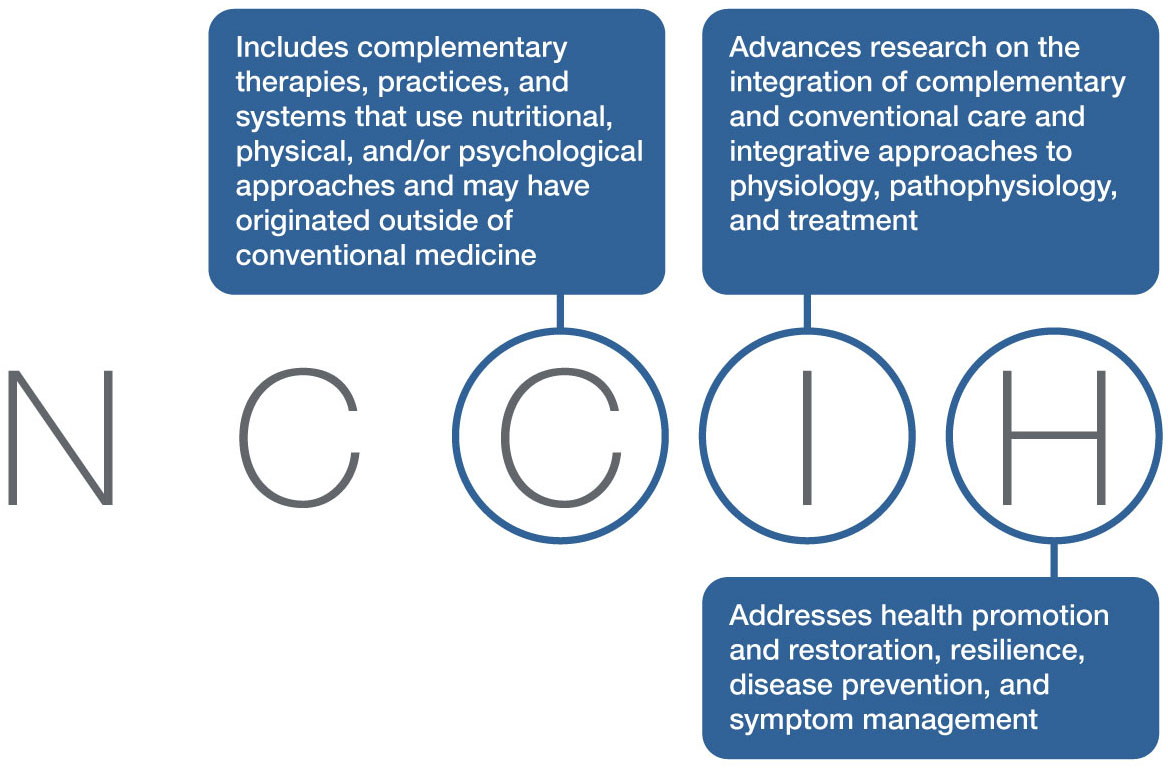NCCIH Strategic Plan FY 2021–2025
Mapping a Pathway to Research on Whole Person Health

Executive Summary
The National Center for Complementary and Integrative Health (NCCIH) was created more than 20 years ago to facilitate the study and evaluation of complementary and alternative health practices. During the past two decades, NCCIH has expanded the scientific knowledge base around these practices and established resources to disseminate this information to the public–ultimately impacting their use. The Center has worked to advance the position that evidence-based complementary therapies should be “integrated” with and not used as an “alternative” to conventional medicine.
NCCIH’s new strategic plan for Fiscal Years (FY) 2021–2025 expands the definition of integrative health to include whole person health, that is, empowering individuals, families, communities, and populations to improve their health in multiple interconnected domains: biological, behavioral, social, and environmental. The plan has been informed and shaped by an effort to better define and map a path to whole person health by expanding and building on current activities while advancing new research strategies and ideas.
"Much progress has been made in the research areas that form the NCCIH portfolio since our last strategic plan was released, and we are now ready to integrate this knowledge into a whole person approach."
- Helene M. Langevin, M.D.
NCCIH Director
Our Mission
The mission of NCCIH is to determine, through rigorous scientific investigation, the fundamental science, usefulness, and safety of complementary and integrative health approaches and their roles in improving health and health care.
Our Vision
Scientific evidence informs decision making by the public, health care professionals, and health policymakers regarding the integrated use of complementary health approaches in a whole person health framework.
The plan has five major objectives:
- Objective 1: Advance fundamental science and methods development. NCCIH prioritizes research to fill gaps in our understanding of the mechanisms by which complex complementary approaches exert their effects. We also recognize the need for methods development to support rigorous studies of complex botanical products, integrated multicomponent therapeutic systems, health restoration and resilience, and the dissemination and implementation of evidence-based complementary approaches.
- Objective 2: Advance research on the whole person and on the integration of complementary and conventional care. NCCIH seeks to support basic, translational, and clinical research on the interaction of multiple physiological systems and the therapeutic effects of multicomponent interventions. The Center is particularly interested in studies conducted in real-world settings and research that focuses on improving health outcomes.
- Objective 3: Foster research on health promotion and restoration, resilience, disease prevention, and symptom management. Focused research is needed to understand why people make healthy, unhealthy, or risky choices and to elucidate the impact of these choices on short- and long-term health. Another priority area for NCCIH is expanding the knowledge base about how complementary health approaches may improve resilience, restore health, and manage symptoms in both the short and long term.
- Objective 4: Enhance the complementary and integrative health research workforce. NCCIH supports research training and career development programs to increase the number of well-trained scientists to conduct rigorous complementary and integrative health research. The Center will continue to promote strategies to enhance the workforce, enhance the clinician-scientist career pathway at both the individual and institutional levels, and enhance the transition of Research Career Development (K) awardees to independent research careers.
- Objective 5: Provide objective evidence-based information on complementary and integrative health interventions. Translating and disseminating scientific information about complementary and integrative health to the public is challenging. Misinformation abounds on these topics, and individuals who use complementary health interventions often do not discuss them with their conventional health care providers. NCCIH will continue to present scientifically objective evidence-based information on complementary and integrative health and to develop methods and resources to enhance the public’s understanding of basic scientific concepts to lay a foundation for improved decision making.
In addition to working toward these specific objectives, NCCIH is committed to serving as an efficient and effective steward of public resources:
- To support the goal of improving women’s and minority health and eliminating health disparities, NCCIH will fund research with diverse populations.
- To ensure that research funded by NCCIH contributes to improved public health and health care, NCCIH will set research priorities that reflect public health needs, scientific promise, amenability of topics to rigorous scientific inquiry, potential to impact health care practices, and relationship to use and practice.
- NCCIH will continue to seek out opportunities to collaborate with other components of the National Institutes of Health (NIH), other Federal agencies, professional societies, patient advocacy groups, and others. Through these collaborations, the Center enhances its research portfolio, expands its multidisciplinary expertise, and incorporates a broader understanding of the health needs and perspectives of the community.
